MD Anderson Research Highlights for September 5, 2025
- Clinical trials show promising results in treating pancreatic and colorectal cancers
- New treatment strategies improve outcomes for patients with kidney and testicular cancers
- Novel research techniques enable advances in gene-drug interactions, breast cancer progression, and identifying pre-cancerous lesions
- Biomarkers help predict risk for oral cancer metastasis
The University of Texas MD Anderson Cancer Center’s Research Highlights showcases the latest breakthroughs in cancer care, research and prevention. These advances are made possible through seamless collaboration between MD Anderson’s world-leading clinicians and scientists, bringing discoveries from the lab to the clinic and back.
Targeted radiation helps patients with kidney cancer delay systemic therapy
Some patients with clear cell renal cell carcinoma (ccRCC) – the most common type of kidney cancer in adults – experience oligometastatic disease, where the cancer has spread to only a few sites. Patients with oligometastatic ccRCC often are treated with whole-body systemic treatments like immunotherapy and targeted therapy, which are effective but can come with unwanted side effects.
A Phase II clinical trial led by Chad Tang, M.D., and Pavlos Msaouel, M.D., Ph.D., explored the use of metastasis-directed targeted radiation therapy to avoid or delay systemic treatments. In a cohort of 121 patients, survival remained high, with 94% of patients alive at two years and 87% at three years. Overall, patients went a median of 34 months without needing systemic treatment.
Researchers also used a novel circulating tumor DNA (ctDNA) test to look for traces of cancer. Patients with no detectable disease stayed off systemic treatments twice as long as those with detectable traces, which suggests that this marker may help select patients for this treatment strategy in the future. These data originally were presented at the American Association for Cancer Research (AACR) Annual Meeting 2025 in April.
Title: Metastasis-directed radiotherapy without systemic therapy for oligometastatic clear-cell renal-cell carcinoma: primary efficacy analysis of a single-arm, single-centre, phase 2 trial
Authors: Chad Tang, Alexander D Sherry, Aaron Seo, Kieko Hara, Haesun Choi, Suyu Liu, Xiaowen Sun, Anya Montoya, Ethan B Ludmir, Amishi Y Shah, Eric Jonasch, Amado J Zurita, Craig Kovitz, Omar Alhalabi, Sangeeta Goswami, Andrew W Hahn, Matthew T Campbell, Arianna Hernandez, Kevin T Nead, Peter Van Loo, Shiqin Su, Christopher J Battey, Matthew L LaBella, Sarah Ratzel, Ashley Acevedo, Giannicola Genovese, Kanishka Sircar, Jose A Karam, Nizar M Tannir, Pavlos Msaouel
Read Summary | Read Full article in Nature Medicine.
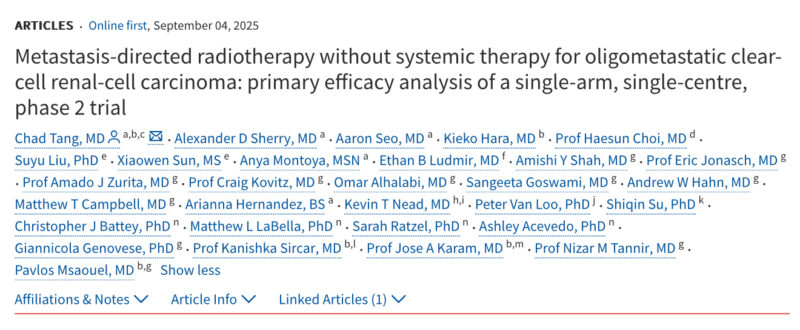
Final trial data from ELI-002 cancer immunotherapy vaccine reinforce promising results
In initial results from the AMPLIFY-201 trial, co-led by Shubham Pant, M.D., an immunotherapy vaccine targeting the lymph nodes showed potential in delaying relapse of KRAS-mutated pancreatic and colorectal cancers for patients who had previously undergone surgery. Long-term final follow-up data of this vaccine, ELI-002 2P, now shows that 17 of 25 patients (68%) had robust T cell responses, which were associated with increased survival.
At 24 months, the median recurrence-free survival had not yet been reached for the higher response group – including all of the patients at the highest two dose levels – with 75% of them still relapse-free, compared to three months for patients who were not high responders. These data prompted the initiation of a Phase II trial that is currently ongoing and includes a new formulation of the vaccine (ELI-002 7P) targeting additional KRAS mutations.
Title: Lymph node-targeted, mKRAS-specific amphiphile vaccine in pancreatic and colorectal cancer: phase 1 AMPLIFY-201 trial final results
Authors: Zev A. Wainberg, Colin D. Weekes, Muhammad Furqan, Pashtoon M. Kasi, Craig E. Devoe, Alexis D. Leal, Vincent Chung, James R. Perry, Thian Kheoh, Lisa K. McNeil, Esther Welkowsky, Peter C. DeMuth, Christopher M. Haqq, Shubham Pant, Eileen M. O’Reilly
Read Full Article. | Read Summary.
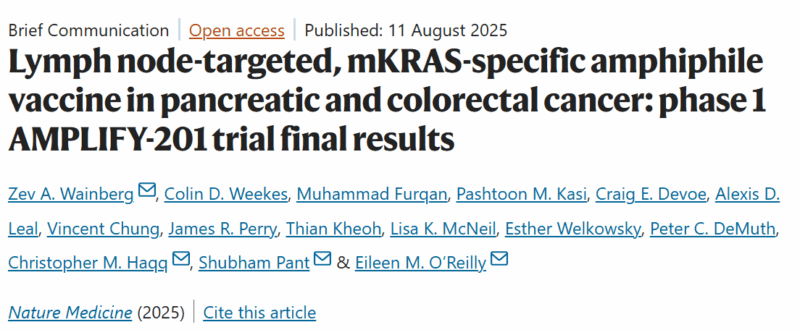
Triple combination therapy shows promise for treatment-resistant microsatellite stable BRAF V600E-mutant metastatic colorectal cancer
The BRAF V600E gene mutation makes colorectal cancers (CRCs) more aggressive, leading to poorer survival rates. While some CRCs with high microsatellite instability respond well to immunotherapy, most BRAF V600E-mutant metastatic CRCs are microsatellite stable (MSS) and do not benefit from these treatments. The combination of encorafenib and cetuximab is Food and Drug Administration (FDA)-approved but has limited duration of response in these patients, which led Van Morris, M.D., and colleagues at MD Anderson to examine the safety and efficacy of adding the anti-PD-1 antibody nivolumab to this combination in patients with MSS BRAF V600E-mutant metastatic CRC.
This Phase I/II trial enrolled 26 patients and showed an overall response rate of 50%, with a median progression-free survival of over seven months. RNA analysis from liquid biopsies identified distinct patterns of response among patients who did or did not benefit from the triple combination. The positive outcomes of this study led to the launch of SWOG S2107, a nationwide Phase II trial in the same patient population, also led by Morris.
Read summary | Read Full Article in Cancer Cell.
Novel sequencing technology links DNA and RNA to provide molecular insights into breast cancer progression
Breast cancer often starts in the epithelial cells lining the milk ducts and lobules, but there are many subtypes that make it challenging to identify the cancer’s starting point within normal tissue. Researchers led by Nicholas Navin, Ph.D., developed a new single-cell DNA and RNA sequencing technology – called wellDR-seq – to identify ancestral breast cancer cells. By studying the impact of chromosome gains or losses on gene expression, the researchers were able to uncover the molecular aspects of why some breast cancers are more aggressive or invasive.
The researchers profiled 33,646 single cells from 12 estrogen-receptor (ER)-positive breast cancers, quantifying the amount of certain genes that are actively expressed in tumor cells, as well as the number of copies of specific genes or chromosome segments and their genetic changes over time. These results provide insights into cancer initiation and invasion. While this technique was applied to cancer research, it can also be used to understand the molecular biology of other diseases.
Title: Coalescing single-cell genomes and transcriptomes to decode breast cancer progression
Authors: Kaile Wang, Rui Ye, Shanshan Bai, Zhenna Xiao, Lei Yang, Jianzhuo Li, Chenling Tang, Emi Sei, Jinyu Peng, Anna K. Casasent, Steven H. Lin, Chandandeep Nagi, Alastair M. Thompson, Savitri Krishnamurthy, Nicholas E. Navin
Read summary | Read Full Article in Cell
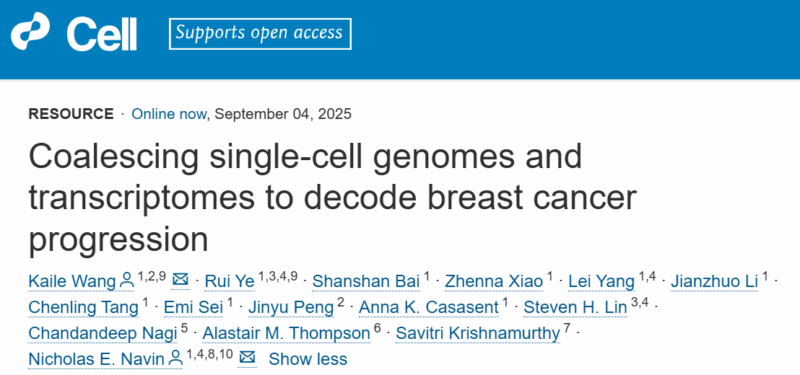
Large-scale CRISPR screening in stomach organoids reveals gene-drug interactions
Scientists often use organoids – laboratory-grown human cell culture systems that closely mimic body organs – to gain deeper insights into cancer biology and understand how tumors respond to drugs. Researchers led by Yuan-Hung Lo, Ph.D., used organoids along with several CRISPR gene editing tools to study how cisplatin chemotherapy interacts with different genes in the human stomach.
The screens revealed an unexpected link between cisplatin sensitivity and fucosylation, a process that adds sugar molecules to cells. The researchers identified the TAF6L gene as a key regulator of cell recovery from cisplatin-induced cytotoxicity. These results show that CRISPR genetic screens in organoids are a powerful way to identify drug-gene interactions that might explain why some people respond better to certain treatments.
Title: Large-scale CRISPR screening in primary human 3D gastric organoids enables comprehensive dissection of gene-drug interactions
Authors: Yuan-Hung Lo, Hudson T. Horn, Mo-Fan Huang, Wei-Chieh Yu, Chia-Mei Young, Qing Liu, Madeline Tomaske, Martina Towers, Antonia Dominguez, Michael C. Bassik, Dung-Fang Lee, Lei S. Qi, Jonathan S. Weissman, Jin Chen, Calvin J. Kuo
Read summary | Read in Nature Communications
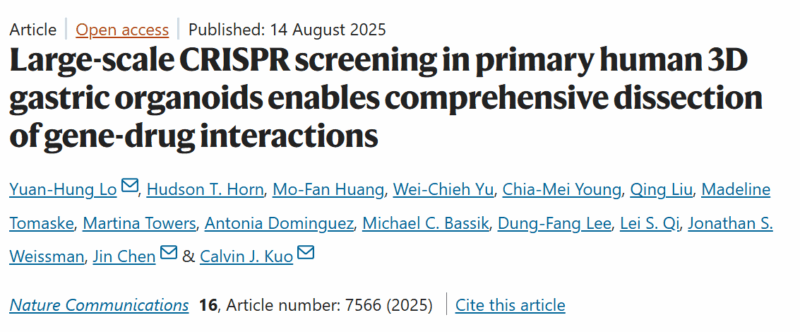
First-in-class pan-KRAS inhibitor shows strong antitumor activity in preclinical models
KRAS is the most commonly mutated gene in cancer, but targeting the mutant protein is notoriously difficult because current therapies work only for certain KRAS mutations. This led researchers Kathleen McAndrews, Ph.D., Anirban Maitra, M.B.B.S., Raghu Kalluri, M.D., Ph.D., and Timothy Heffernan, Ph.D., to examine the efficacy of a first-in-class inhibitor called BI-2493. This pan-KRAS inhibitor can target the mutant protein in multiple cancer types, regardless of the specific mutation present. BI-2493 was developed as part of the strategic collaboration between Boehringer Ingelheim and MD Anderson.
In several models of pancreatic cancer, BI-2493 effectively suppressed tumor growth in vitro and prolonged survival in vivo, with further analysis showing confirmed RAS pathway inhibition. BI-2493 also remodeled the tumor microenvironment of immune-compromised models, increasing intratumoral immune cells and decreasing myeloid cells, allowing for better immunotherapy response. These findings highlight the therapeutic potential of combining BI-2493 with other treatments to inhibit a variety of KRAS mutations and improve patient outcomes.
Title: An allele-agnostic mutant-KRAS inhibitor suppresses tumor maintenance signals and reprograms tumor immunity in pancreatic cancer
Authors: Kathleen M. McAndrews, Francesca Paradiso, Clint A. Stalnecker, Benson S. Chellakkan, Fredrik I. Thege, David H. Peng, Barbara A. Moreno Diaz, Hikaru Sugimoto, Sarah I. Patel, Krishnan K. Mahadevan, Michelle L. Kirtley, Danielle Wills, Amari M. Sockwell, Andre Luis F. Fonseca, Yunhe Liu, Kimal I. Rajapakshe, Nathaniel G. Yee, Phuong Thao Tran, Huda Alchikh Omar, Antonio Tedeschi, Fiorella Schischlik-Siegl, Andrew S. Boghossian, Matthew G. Rees, Melissa M. Ronan, Jennifer A. Roth, Dorothea Rudolph, Martin Aichinger, Florian Ebner, Artem V. Artemov, Jesse Lipp, Laura Pisarsky, Valerie Laura Herrmann, John Park, Jörg F. Rippmann, Otmar Schaaf, Vanessa Chandler, Mariah Williams, Charles E. Deckard, Linghua Wang, Channing J. Der, Christopher Vellano, Paola A. Guerrero, Timothy P. Heffernan, Raghu Kalluri, Anirban Maitra
Read summary | Read Full Article in Science Translational Medicine
High-dose chemotherapy improves outcomes for multiply relapsed and refractory germ-cell tumors
Testicular cancer is the most common malignancy in young men ages 15 to 35. Most patients respond well to cisplatin-based chemotherapy, with cure rates for metastatic disease as high as 70-80%, but some patients have tumors that relapse. High-dose chemotherapy (HDC) can be effective for some patients after an initial relapse, but outcomes are poor for those with multiple relapses or refractory tumors. In a Phase II trial, researchers led by Yago Nieto, M.D., Ph.D., examined the safety and efficacy of a new HDC specifically targeting DNA damage repair in combination with the targeted therapy bevacizumab.
The trial enrolled 65 patients with multiply relapsed and heavily pretreated testicular and other germ-cell tumors. The five-year relapse-free and overall survival rates were 54% and 55.5%, respectively, exceeding expectations. However, the addition of bevacizumab did not improve outcomes. These results were subsequently validated in a prospective cohort of 100 patients with similar poor prognosis, highlighting the promising impact of targeting DNA damage repair pathways to improve outcomes for these patients.
Title: High-dose chemotherapy improves outcomes for multiply relapsed and refractory germ-cell tumors
Authors: Yago Nieto, John F. Ward, Wayne Hofstetter, David Rice, Jose A. Karam, Louis Pisters, Jean-Nicolas Vauthey, Amishi Shah, John K. Lin, Andrew C. Johns, John Araujo, Shi-Ming Tu, Jianbo Wang, Jing Li, Ala Abudayyeh, Peter F. Thall, Roland Bassett, Melissa Barnett, Alison Gulbis, Terri Lynn Shigle, Jeremy Ramdial, Uday Popat, Muzaffar Qazilbash, Roy B. Jones, Borje S. Andersson, Elizabeth J. Shpall, Irtiza Sheikh, Lance Pagliaro, Matthew T. Campbell
Read summary | Read Full Article in Clinical Cancer Research
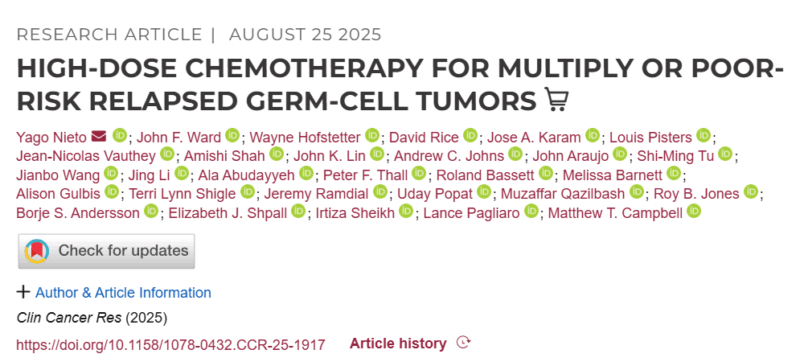
Fluorescent tracer helps identify precancerous lesions in pancreatic cancer models
During surgical treatment for pancreatic cancer, pre-malignant pancreatic lesions – which can develop into pancreatic cancer – often go unnoticed and can later cause recurrence. Researchers led by Charles Manning, Ph.D., investigated whether a new fluorescent imaging agent, V-1520, could better identify these areas for removal. V-1520 works by locating and binding to a specific protein biomarker that is overexpressed in high-risk tumor-associated macrophages within the pancreatic tumor microenvironment.
Once bound, it emits near-infrared light that can be detected by imaging equipment, allowing surgeons to visualize high-risk areas during surgery. Notably, preclinical models showed a strong uptake of V-1520 in cancer-associated inflammation, but not in pancreatitis – a common but benign condition. Since V-1520 does not target tumors directly and instead binds to overexpressed proteins in the tumor microenvironment, this early detection strategy could also be effective in other cancer types.
Title: Preclinical Fluorescence-Guided Imaging Leveraging Surrounding Sentinel Tumor Microenvironment Identifies High-Risk Premalignant Pancreatic Lesions
Authors: Shilpa Sharma, Xiaoxia Wen, Jianbo Wang, Beibei Huang, Denise Hernandez, Cong-Dat Pham, Zhiwen Liu, Susanne Je-Han. Lin, Aiko Yamaguchi, Dimitra K. Georgiou, Ryan P. Coll, H. Charles Manning
Read summary | Read Full Article in Clinical Cancer Research
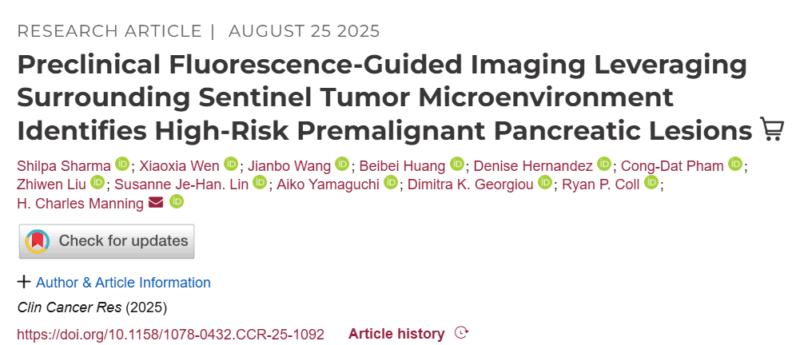
Researchers identify predictive biomarkers for oral cancer metastasis
Most oral cancers start in squamous cells lining the mouth and tongue, and frequently metastasize to the lymph nodes. To identify potential biomarkers that predict this metastasis, researchers led by Koichi Takahashi, M.D., Ph.D., and Ken Furudate, D.M.D., Ph.D., performed a comprehensive spatial analysis of the tumor microenvironment surrounding oral cancer cells that metastasized to the lymph nodes.
They found increased levels of a specific type of activated supportive cell, called myofibroblastic cancer-associated fibroblasts (myCAFs), located within the invasive tumor front. The researchers showed that cancer cells don’t act alone, and are, instead, aided by these myCAF “accomplices.” The researchers also characterized several key players in the metastasis pathway, extracting a spatial molecular fingerprint to create a 23-gene signature that can predict lymph node metastasis and poor prognosis in patients with oral cancer.
Honors and Awards
Title: Spatial colocalization and molecular crosstalk of myofibroblastic CAFs and tumor cells shape lymph node metastasis in oral squamous cell carcinoma
Authors: Ken Furudate, Shuya Kasai, Tadashi Yoshizawa, Yuya Sasaki, Kohei Fujikura, Shintaro Goto, Ryohei Ito, Koki Takagi, Tomoyuki Tanaka, Hiroshi Kijima, Kosei Kubota, Ken Itoh, Wataru Kobayashi, Koichi Takahashi
Read summary | Read Full Artcle in PLOS Genetics

About MD Anderson
The University of Texas MD Anderson Cancer Center in Houston ranks as one of the world’s most respected centers focused on cancer patient care, research, education and prevention. The institution’s sole mission is to end cancer for patients and their families around the world, and, in 1971, it became one of the nation’s first National Cancer Institute (NCI)-designated comprehensive cancer centers. MD Anderson is No. 1 for cancer in U.S. News & World Report’s “Best Hospitals” rankings and has been named one of the nation’s top two hospitals for cancer since the rankings began in 1990. MD Anderson receives a cancer center support grant from the NCI of the National Institutes of Health (P30 CA016672).
You can find more posts featuring MD Anderson Cancer Center on OncoDaily.


